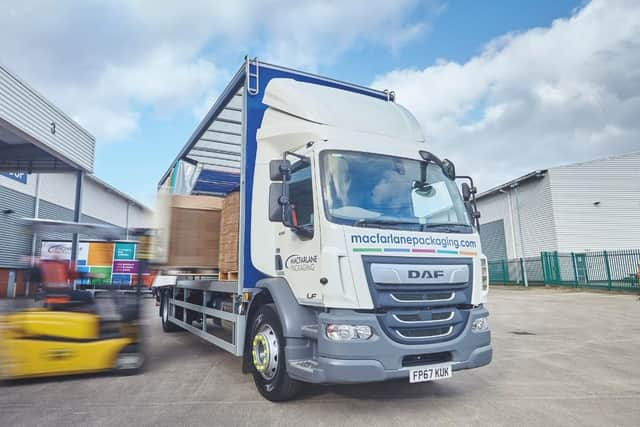Scots packaging group Macfarlane braced for inflationary challenge after robust results
Posting first-half results revealing a rise in sales and profit, the Glasgow-headquartered group said it had achieved a “solid performance”, particularly when compared to a strong trading period a year earlier.
It said this had been achieved against the backdrop of a slowdown in spending from the e-commerce sector and “significant inflationary pressure” on operating costs.
Advertisement
Hide AdAdvertisement
Hide AdAs well as distributing a range of protective packaging products, the firm designs and manufactures packaging for high value and fragile items.
The business employs more than 1,000 people at 37 sites, principally in the UK, as well as in Ireland, Germany and the Netherlands. It supplies more than 20,000 customers, chiefly in the UK and Europe.
Chief executive Peter Atkinson pointed out that utility costs accounted for a relatively small proportion of the group’s outgoings, with other rising costs such as labour presenting a bigger challenge. He also highlighted a “strong pipeline” of potential acquisitions in the UK and mainland Europe following a recent German deal.
Results for the six months to the end of June show the group generated revenues from continuing operations of just over £139.2 million, up 14 per cent on a year earlier. Operating profit was up 4 per cent to £9.6m while profit before tax rose 3 per cent to almost £8.9m. An interim dividend of 0.9p per share was declared, marking a year-on-year increase of 3 per cent.
Chairman Stuart Paterson said: “The group has achieved a solid performance in the first half of 2022. This has been achieved against the backdrop of a slowdown in spend from the e-commerce sector and significant inflationary pressure on operating costs. We have also made strategic IT investments and incurred start-up costs on our new north-west of England distribution centre.


“We expect to experience a continuing challenging environment with inflationary pressure on our operating costs and slower demand from our e-commerce customers.
“Overall, the group is confident that the effectiveness of our strategy, the diversity of the customers and sectors we serve, the quality of our people, and the resilience of our business model will ensure 2022 will be another year of growth for Macfarlane.”
After nine years serving on the board, Paterson is set to be replaced as chairman by Aleen Gulvanessian, who joined the board last October.
Advertisement
Hide AdAdvertisement
Hide AdAnalysts at house brokerage Shore Capital said the firm had published a “robust” set of first-half numbers, “pleasingly demonstrating continued year-on-year revenue, profits and earnings growth”.
They added: “The update provides the board and us with confidence in the group meeting our [full-year] estimates, so we leave them unchanged at this juncture.
“We remain excited around the group’s growth opportunities especially within industrial markets and as it continues to gain traction in continental Europe by leveraging its ‘buy & build’ model.”
In May, Macfarlane sealed its first overseas acquisition in a number of years, with the firm buying PackMann, a packaging distribution business based in Eppelheim near Heidelberg, Germany, in a multi-million euro deal.
The group said the acquisition was in line with its strategy of building its protective packaging business in northern Europe through a combination of organic and acquisitive growth.
Comments
Want to join the conversation? Please or to comment on this article.